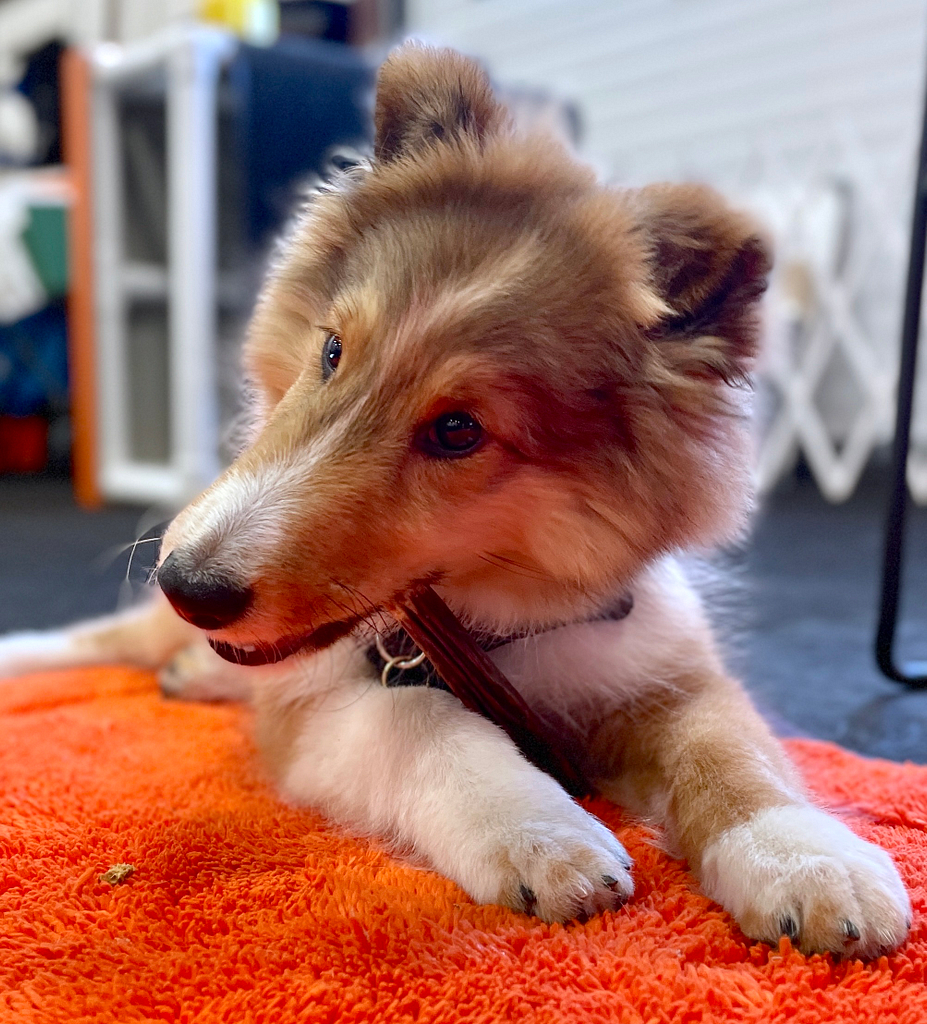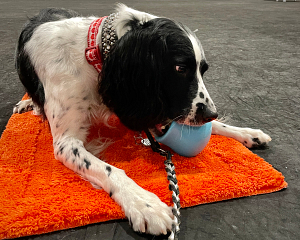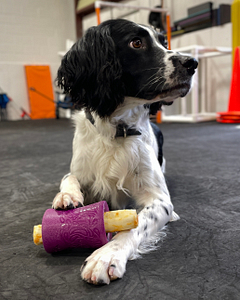
Initial considerations
There are a few things to keep in mind when selecting a chew for your dog to enjoy during group dog training classes.
It needs to have caloric value, which ensures it is tasty enough to keep your dog’s interest. Items that don’t have caloric value are fantastic for chewing on at home, they just aren’t appropriate for dog training class. This means no Benebones, Nylabones, BetterBones, or antlers.
Dental chews like Greenies don’t last long enough for dog training class. They’re designed to be completely eaten in just a minute or two, leaving you high and dry for the next forty-three minutes of class. For this reason, biscuits and jerky are also not appropriate chews for class.
Crumbs and drool happen! Try to keep your dog’s chew on their mat to reduce any leftover mess.
Enrichment toys count as chews!

- Peanut butter: super tasty but high in calories. Try to limit to no more than 1 tablespoon per ~30 pounds of body weight.
- Cream cheese: puppies LOVE this! Whipped cream cheese is even easier to spread.
- Baby food: single-ingredient meat-based baby food is a fantastic option for dogs with food allergies or sensitive stomachs. Dogs with a sweet tooth may enjoy fruit-based baby food. Note that richly-colored purees (beet, pumpkin) may stain clothes or your mat!
- Liverwurst: extraordinarily high value for most dogs
- Plain yogurt: a bit boring on its own, but can be a great way to “cut” higher value, higher calorie spreads to make them last longer
- Bones & Co. Goat Whip: nutritious & full of healthy probiotics (available in our freezer)
Consider bringing a refill to class with you, as your dog might finish their enrichment toy. You can also freeze your enrichment toy after stuffing it, and it will last longer. (Test this out before class, as some dogs don’t like frozen treats.)
Hint: if your dog absolutely loves one of these creamy treat options, you can put it in a squeeze tube and use it as a training reward!
Channel your inner Goldilocks
There is a “Goldilocks” element to selecting the right chew for a dog training class: not too hard, not too easy, but just right. If it is too hard, your dog will ignore it. If it is too soft, your dog will eat it really fast. If they fill up on the chew, they won’t have any room left in their belly for treats! It also means they won’t have it available for the rest of the instruction periods during that class.
If you’re shopping in our retail store, we have labeled all bulk chews Easy, Medium, or Hard. Easy level is perfect for puppies who still have their baby teeth, small dogs under 20 pounds, and senior dogs. Medium level is great for older puppies and dogs up to 40 pounds. Hard level is ideal for dogs over 40 pounds who love to chew. If you already know your dog is a vigorous chewer, go up one level. For example, if you have an 18 pound dog who grinds down chews very quickly, shop the Medium category instead of Easy.
Select a chew that will take your dog between 30-60 minutes to eat. Ideally, you can use it for more than one class.
But my dog doesn’t like chews!
If your dog doesn’t like to chew, first be sure to mention this to your veterinarian. Chewing is a natural behavior for dogs, and reluctance to do so could indicate a health problem such as a broken or chipped tooth. Chances are, though, that your dog just hasn’t been offered the right one yet.
Start with chews labeled Easy, as they’ll be softer, smaller, and more enticing to your dog. Experiment with different proteins! Most chews on the market are beef-based, but we also have chicken, turkey, duck, ostrich, pork, lamb, bison, buffalo, venison, alligator, salmon, and cod to choose from. Also experiment with different body parts such as ears, tracheas, skin, and tendons.
Some dogs really like it if you hold the chew for them as they get it started. For other dogs, a little dab of something they really like, such as peanut butter, can help them get the party started.
Chew examples for your first class

7″ and 11″ Earth Animal No Hide chews last far longer when pushed into a West Paw Funnl toy, as seen here.
For a small-breed puppy…
- A lick mat with whipped cream cheese
- A Toppl with chicken baby food
- A cod skin twist
- A freeze-dried duck neck
For a 20 to 30 pound adult dog, or medium- to large-breed puppy…
- A bully ring or 6″ bully stick in a Bow Wow Buddy holder
- A frozen Pupsicle stuffed with a mix of peanut butter and yogurt
- An ostrich giblet disc
- A beef cheek slice
- A 7″ Earth Animal No Hide in a Funnl holder
For a medium- to large-breed adult dog…
- A 12″ beef or bison bully stick in a Bow Wow Buddy holder
- A beef cheek roll
- A frozen Kong toy with a mix of Goat Whip and baby food
- A beef combo chew
